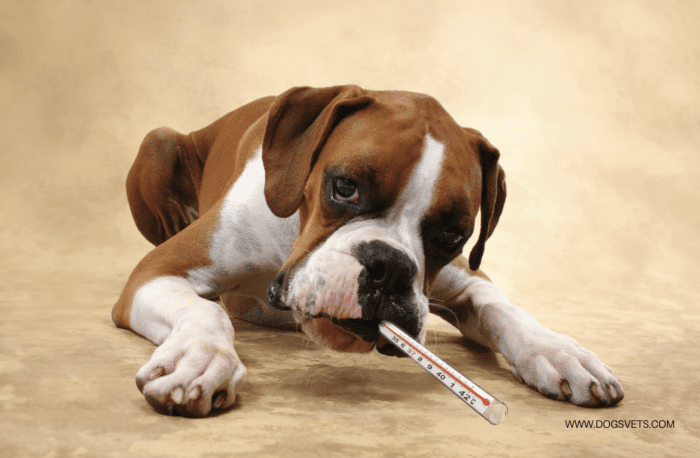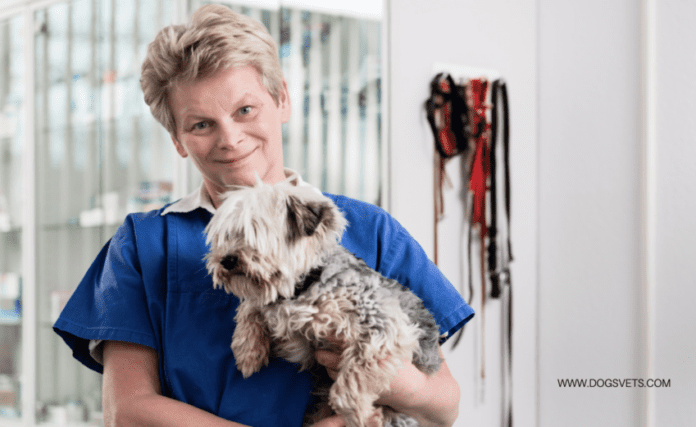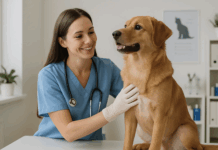Last Updated on November 18, 2022 by Dogs Vets
Health Conditions Puppy Owners Need To Be Aware Of
A healthy, well-cared-for dog has an average lifespan of 10 to 13 years, although they can live until their 20-years-old. To reach this age, you must give your dog the best start in life and that means protecting them when they’re a puppy.
Due to their young age and immature immune systems, puppies are at risk of various health conditions.
Thankfully, most puppy owners are proactive as Banfield Pet Hospital says that puppy visits have increased by more than 14% in recent years. So, let’s find out what health problems puppies are susceptible to, so you can get the help he or she needs.
Canine parvovirus (parvo)
Parvovirus is highly contagious among dogs. It’s a nasty illness that causes gastrointestinal symptoms. The most common symptom is bloody diarrhea.
Puppies are most likely to get parvo between the ages of six weeks old to 20 weeks.
If parvo is left untreated, it’s fatal in 91% of cases. You can give your puppy the best chance by getting him to the vet for treatment as quickly as possible. Thankfully, you can lower the chance of your puppy getting parvo.
Puppies should be vaccinated against parvo at 6, 8, and 12 weeks of age. You should also avoid letting your pup mix with other dogs before he has been vaccinated.
Kennel cough
Kennel cough is another highly contagious disease. It is most commonly found in settings where there are a lot of dogs. If you got your puppy from an animal shelter, he may carry the disease and symptoms will show shortly after you get him home.

Many puppy owners enroll their puppies in training groups or put them in daycare – kennel cough is also likely to lurk in these places.
Young puppies are most at risk of kennel cough as it can cause pneumonia. Your vet is likely to give your puppy antibiotics to stop this from happening.
Fleas & ticks
Fleas and ticks are the most common parasites dogs and puppies get.
A puppy with fleas will be very itchy because each flea lays 20 eggs a day. At this rate, it doesn’t take long for a small puppy to be covered in bites.
If you allow your puppy to play outside in woodland and tall grass they may get a tick.
Ticks are bloodsuckers and can cause skin irritation and illnesses, such as Lyme disease. Spot-on flea treatments are a good way to get rid of fleas.
A tick remover or a pair of tweezers can be used to remove a tick from your puppy. But be careful as the tick needs to be removed with the head intact.

The best thing you can do for your puppy’s health is to give him anti-flea and anti-tick products regularly. These are usually given monthly, although some are given less frequently. Speak to your vet about the most suitable treatments for your pup.
Dog flu
Just like humans, dogs can get the flu. It’s not the same virus though, so don’t worry about passing the flu on to your puppy.
A puppy with the flu will have an upper respiratory tract infection and will display symptoms such as high fever, cough, loss of appetite, sneezing, and fatigue.
The only way a vet can diagnose your puppy with the flu is via tests which cost around $200.
If your puppy’s vet confirms or suspects that your pup has canine flu, nonsteroidal anti-inflammatory drugs may be prescribed.
Antibiotics may be given too if there’s a risk that your puppy will develop a secondary infection. You can make things easier for your puppy by encouraging lots of rest, making him comfortable, providing fresh, clean water, and giving plenty of cuddles.
Low blood sugar
Hypoglycemia occurs when a puppy’s blood sugar levels are too low. Puppies are at a much greater risk of getting hypoglycemia compared to adult dogs.
The small size of a puppy means they don’t have enough reserves in their body to rely on, which is how the condition develops. Pint-sized pooches are particularly at risk.
A hypoglycemic puppy will be weak, sleepy, disorientated, shaky, and twitchy. He may even have a seizure or lose consciousness. If you suspect hypoglycemia, give him a spoonful of honey straight away.
If this doesn’t resolve the issue within 10 minutes, get your pup to the vet. You can prevent future hypoglycemic episodes by feeding your pup little and often to keep his sugar levels up. You may also need to add some corn syrup to his water bowl.
It’s common for puppies to experience some health complaints.
Most of the time, these will be minor things that can be quickly resolved. But there are some more serious health issues as mentioned above that you need to be aware of so your pup can enjoy a long and healthy life.
Facts Check
We hope you enjoyed this article… What are your thoughts?
Please feel free to share this article!























